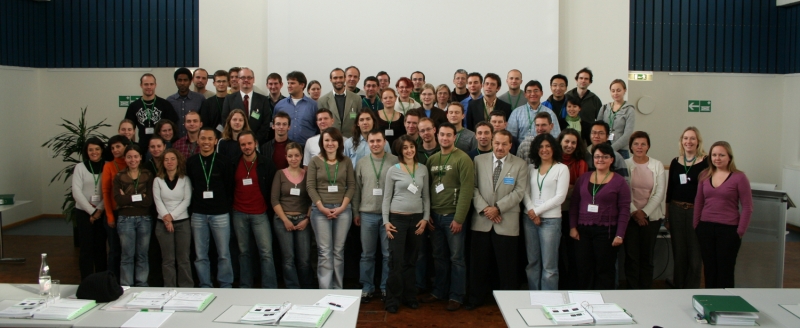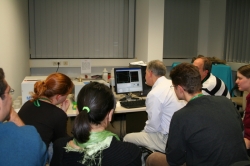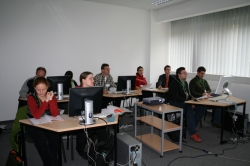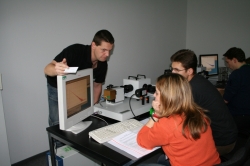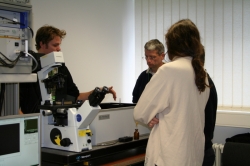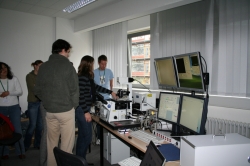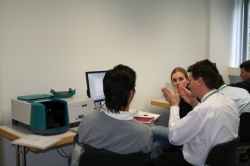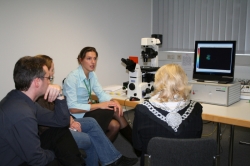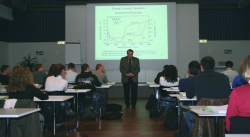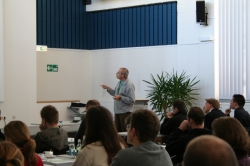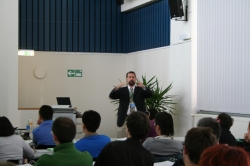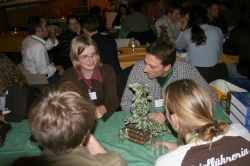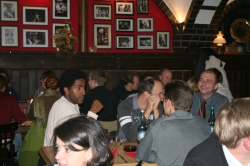Fluorescence Course
4th European short course on
"Principles and Applications of Time-resolved Fluorescence Spectroscopy"
October 30 - November 3, 2006 in Berlin, Germany

 This course is held in cooperation with Prof. J.R. Lakowicz from the Center for Fluorescence Spectroscopy & the Department of Biochemistry and Molecular Biology, University of Maryland School of Medicine, Baltimore, Maryland, USA
This course is held in cooperation with Prof. J.R. Lakowicz from the Center for Fluorescence Spectroscopy & the Department of Biochemistry and Molecular Biology, University of Maryland School of Medicine, Baltimore, Maryland, USA
Summary
This course was held in Europe for the fourth time and was again a great success. Altogether 80 people from universities and industry from more than 21 countries participated. They attended 15 lectures and 6 hands-on experiment sessions with 10 different instruments from 5 companies, covering different methods and procedures in fluorescence spectroscopy.
Aims and Purpose
The course is intended for individuals wishing an in-depth introduction to the principles of fluorescence spectroscopy and its applications to the Life Sciences. Attendees are typically professionals who are using or intend to use fluorescence in their research. Most attendees have some knowledge of fluorescence, typically in a specialized area. However, other individuals, from totally different research areas and industry, get the opportunity to enter this exciting field in a very effective way and benefit especially from the experimental section.
Course organisation
The lectures on Monday and Tuesday dealt with basic principles of fluorescence spectroscopy, while from Wednesday to Friday more specialized topics were covered:
Monday and Tuesday - Principles of Fluorescence Spectroscopy
These lectures dealt with the basics of steady-state and time-resolved fluorescence spectroscopy and instrumentation. They covered time- and frequency-domain measurements, anisotropy, solvent effects, quenching and Förster Resonance Energy Transfer (FRET), as well as an introduction into data analysis.
Wednesday to Friday - Time-Resolved Fluorescence Spectroscopy: Principles, Instrumentation and Applications
These lectures emphasised time-resolved fluorescence along with advanced applications of fluorescence in biophysics, sensing, imaging, clinical chemistry, microscopy and ultrasensitive detection. Guest lectures were given on various topics, like fluorescence microscopy, correlation spectroscopy, single molecule detection and fluorescence markers.
Apart from the lectures, hands-on experimentation (steady-state and time-resolved experiments as well as data analysis) was offered on various instruments provided by market leading companies.
Hands-on instrumentation
The following companies offered hands-on experiments during the course:
- Olympus
- Horiba Jobin Yvon
- PicoQuant
- Lambert Instruments
- Varian
Course instructors
- Joseph R. Lakowicz, Professor of Biochemistry and Director of the Center for Fluorescence Spectroscopy
- Zygmunt "Karol" Gryczynski, Professor at the Department of Molecular Biology and Immunology at the University of North Texas
- Rainer Erdmann, Managing Director of the R&D company PicoQuant GmbH and specialist in ultrasensitive fluorescence analysis
- Matthias Patting, Senior Scientist at PicoQuant GmbH and specialist in software design for time-correlated single photon counting instrumentation
- Michael Wahl, Senior Scientist at PicoQuant GmbH and specialist in instrumentation for time-correlated single photon counting
Guest lecturers
- Manfred Auer, Head of Innovative Screening Technologies (IST) at the Novartis Lead Discovery Center, as well as lecturer for Biophysical Chemistry at the University of Salzburg, Austria. He specializes in the development of novel drug discovery technologies.
- Axel Dürkop, Assistant Professors at the University of Regensburg. He specializes in the synthesis and application of transition metal complexes as labels and probes for proteins and DNA.
- Jörg Enderlein, Head of the Single Molecule Detection group at FZ Jülich, Germany. He specializes in Single Molecule Detection, Fluorescence Correlation Spectroscopy (FCS) and complex data analysis.
- Martin Hof, Head of the Biospectroscopy Laboratory at the J. Heyrovský Institute of Physical Chemistry, Prague, Academy of Sciences of the Czech Republic. He specializes in the application of various fluorescence spectroscopy techniques for the study of biologically relevant processes.
- Johan Hofkens, Head of the single molecule and fluorescence microscopy group in the laboratory for photochemistry and spectroscopy, devision for molecular and nanomaterials, departement for chemistry, KULeuven, Belgium. He is specialized in application of time resolved fluorescence techniques and single molecule spectroscopy in material science and biosciences.
Schedule
The time schedule and program are still available for download as pdf documents.
Archive
The European short course on "Principles and Applications of Time-resolved Fluorescence Spectroscopy" is an annual event since 2003. For further details about each year's event, please select the year from the list below.
Thank you for registering for the Fluorescence Course!
An email with the supplied information has been sent to the provided address.
×

